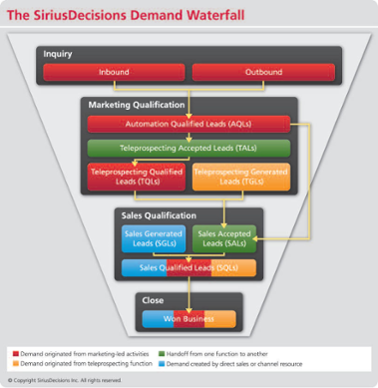“Please place me on your no-call list.”
This is the phrase I’ve learned to repeat whenever someone calls my house during dinner time. Some anonymous person is always trying to solicit my money for products I definitely don’t need. A Shake Weight? No thank you! A subscription to Martha Stewart Living? Certainly not! A common misconception about these calls is that anyone who uses the telephone to increase revenue for a company is an annoying telemarketer. But that’s simply not true.
This isn’t the first time that someone has written about teleprospecting vs. telemarketing, even at this site, but we thought it was time to revisit the topic. The etymology of the word “teleprospecting” is continually evolving (Sirius Decisions, a company that provides quality sales and marketing insights from people who have direct experience managing these functions, just released a new report about teleprospecting last year), and it’s important for businesses to stay updated, making sure their teleprospectors are able to correctly distinguish themselves from telemarketers. Teleprospecting is a more arduous – and more rewarding – job than telemarketing, but many people don’t know why.
Telemarketers - The Scripted Speakers
Telemarketers use a business-to-consumer selling practice, targeting a single person and following a long list of haphazardly collected names. Usually this means simply following the phone book. As a result, all calls are cold calls.
Calls are usually scripted; it’s not so hard to get a telemarketer to hang up on you if you ask them a question they can’t answer. (Even a “How about you call back at another time?” or “Maybe I could talk to someone who knows about the product more” might scare them off.)
According to Sirius Decisions, telemarketers are responsible for three jobs: adding new names to a database, enriching current records and registering prospects for events. All done in one phone call.
Teleprospectors - The Canny Communicators
The term “inside sales” came about in the 1980s to differentiate from the term “telemarketing,” which had been around since late 1970s. For our purposes, teleprospecting is the function of an inside sales representative; thus, an inside sales rep is a teleprospector.
Teleprospecting is a complex function which uses a business-to-business selling practice. The point of the teleprospector’s job is to qualify a potential opportunity. In layman’s terms, teleprospectors, or inside sales reps, determine if a company is the right fit for their product.
Ideally teleprospectors know who to call because marketing has strategically amassed a targeted list of business who potentially want or need the product being sold. Teleprospecting consists of some cold calling, but mostly warm calling, where the prospect already expects a call and is open for discussion. An effective call process includes multiple “touches” to key decision-makers and strategic assessment of the target businesses. It also usually includes setting a up meeting or call with an outside sales executive and a key decision maker for later in the week, or later in the year, to circle back at a more appropriate time in their buying cycle.
Despite the misleading name, teleprospectors aren’t only using the telephone; they’re also using email and in some cases direct mail to drive prospects to interact before engaging them in a telephone call.
In B2B businesses, teleprospecting has become more and more prevalent today. Its function has become highly diversified, and many are still struggling to manage teleprospectors, who are usually young millennials. When managers assess their team of inside sales reps, they focus on dials per day, connects per day, conversations per day, leads per week, sales acceptance and overall revenue contribution. Just from these metrics, it’s obvious that teleprospectors do a lot for the business they’re working for than most people realize.
Teleprospectors also collaborate with the outside sales team, who in return act as a coach or mentor to them. The position also has the potential for a promotion, which isn’t normally the case for telemarketers.
The Sales Process - The Overall Operation
All this is done within the umbrella of the entire sales process. The sales process refers to the progression of a deal from the cradle to the grave. Teleprospecting functions play a critical role within what many call the sales process “funnel.” Sirius Decisions recently re-architected their version of the funnel, which they term the Demand WaterfallTM, qualifying teleprospecting’s role within it.
 In each phase of the Demand Waterfall TM (inquiry, marketing qualification, sales qualification and close), teleprospectors are prevalent, according to Sirius Decisions. Inside sales reps must understand the origin of a lead so they can qualify it effectively in the inquiry phase. In the marketing qualification phase, teleprospectors must be technologically savvy in order to improve the quality of leads marketing passes to them. In many ways, teleprospectors are liaisons between marketing and sales. A new phase added to the Demand Waterfall TM, “Teleprospecting Accepted Leads,” acknowledges inside sales reps’ responsibility to more productive calling, as they explicitly accept or deny automated quailfied leads. This minimizes time spent calling potentially unqualified leads. Finally, while teleprospectors do not play a direct role in the final two phases of the Demand Waterfall TM, their transparency and accountability affects the process, as inside and outside sales reps work together.
In each phase of the Demand Waterfall TM (inquiry, marketing qualification, sales qualification and close), teleprospectors are prevalent, according to Sirius Decisions. Inside sales reps must understand the origin of a lead so they can qualify it effectively in the inquiry phase. In the marketing qualification phase, teleprospectors must be technologically savvy in order to improve the quality of leads marketing passes to them. In many ways, teleprospectors are liaisons between marketing and sales. A new phase added to the Demand Waterfall TM, “Teleprospecting Accepted Leads,” acknowledges inside sales reps’ responsibility to more productive calling, as they explicitly accept or deny automated quailfied leads. This minimizes time spent calling potentially unqualified leads. Finally, while teleprospectors do not play a direct role in the final two phases of the Demand Waterfall TM, their transparency and accountability affects the process, as inside and outside sales reps work together.
Teleprospecting is an evolving role in the sales process. They are an important and necessary parts of the sales process, as they affect every phase. As more companies understand the importance of teleprospecting, their processes will become more efficient and yield better results in the form of increased sales pipeline and revenue.
While teleprospectors affect the entire sales process with strategic calling to other businesses, telemarketers follow a list of names. They are completely different roles except for the fact that both use the telephone. Teleprospectors are part of the bigger picture; telemarketers promote one product continuously.
So next time you pick up the phone at work and a teleprospector answers, keep in mind that the person on the other line is skilled, strategic and most importantly honestly cares about your input.




Join the Conversation